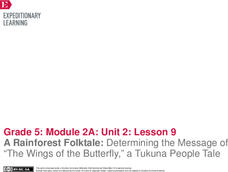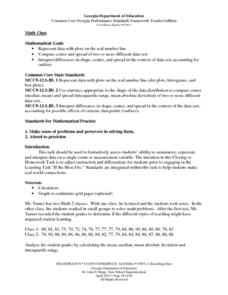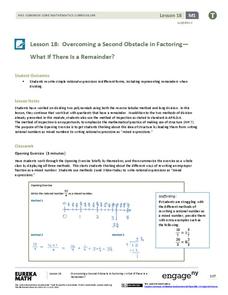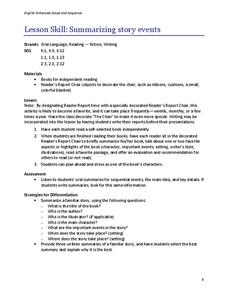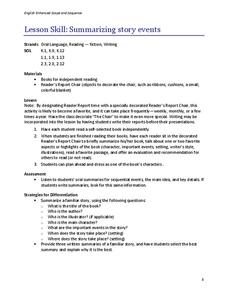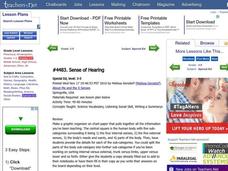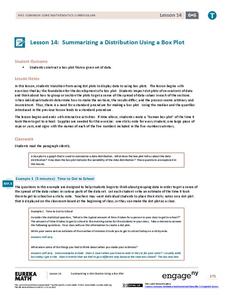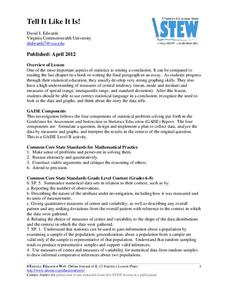Curated OER
Ready Set Go Woah: KWL for Ender's Game
Readers of Orson Scott Card's award-winning science fiction novel, Ender's Game use the provided KWL worksheet to list what they already know about war, what they think they will learn in reading the book, the new information they...
Student Handouts
Learning Cubes
Add a game-like aspect to class discussion or writing with a die that has something other than numbers on it. You or your learners can roll the die to decide if it's time analyze, compare and contrast, describe, explain and illustrate,...
EngageNY
A Rainforest Folktale: Determining the Message of “The Wings of the Butterfly,” a Tukuna People Tale
Did you the message? Scholars listen to a read aloud of The Wings of the Butterfly to summarize and determine the message of the text. They discuss the folktale and vocabulary in groups, then use a double bubble map to compare the story...
Teacher's Corner
Hey Batter, Wake Up!
Does jet lag affect a baseball team's performance in games? Read about how a baseball team's chance of winning a game can be affected by traveling over one, two, and three time zones. Readers then respond to five short answer questions...
Georgia Department of Education
Math Class
Young analysts use real (provided) data from a class's test scores to practice using statistical tools. Not only do learners calculate measures of center and spread (including mean, median, deviation, and IQ range), but...
EduGAINs
Go H2O! Investigating Residential Water Systems
Before your learners excuse themselves to get a drink at the water fountain, prompt them to think about where that water comes from. A middle school science lesson encourages groups to research their community's source of drinking water,...
EngageNY
Overcoming a Second Obstacle in Factoring—What If There Is a Remainder?
Looking for an alternative approach to long division? Show your classes how to use factoring in place of long division. Increase their fluency with factoring at the same time!
Statistics Education Web
It Creeps. It Crawls. Watch Out For The Blob!
How do you find the area of an irregular shape? Class members calculate the area of an irregular shape by finding the area of a random sampling of the shape. Individuals then utilize a confidence interval to improve accuracy and use a...
August House
Stone Soup
Sharing and cooperation are difficult skills for kindergartners to grasp. Using the story Stone Soup and a series of activities, kids learn about the benefits of working together, categorizing and comparing items, and eating...
EngageNY
The “WhatPower” Function
The Function That Shall Not Be Named? The eighth installment of a 35-part module uses a WhatPower function to introduce scholars to the concept of a logarithmic function without actually naming the function. Once pupils are...
EngageNY
Mid-Module Assessment Task: Grade 7 Mathematics Module 5
Determine the probability that the class knows probability. The three-question assessment presents problems with finding the sample space and the probability, theoretical and experimental, of a variety of situations. Pupils also describe...
West Contra Costa Unified School District
Square and Square Roots
Root for your pupils to learn about roots. Young mathematicians first review the meaning of squares and square roots. They then use this knowledge to simplify square roots of monomials with variables.
US National Archives
WWII: Western Europe 1939-45 – Hamburg
Was bombing German cities an effective means to an end, or was it a war crime? Could it be both? Young historians ponder these questions with an activity that prompts them to use primary sources to summarize the debate surrounding RAF...
EngageNY
Research Skills, Part 1: Natural Resource Development and How it Modifies the Physical Environment
Put it in your own words. Scholars complete a mini instructional activity about paraphrasing then complete a note catcher using the text A Limited Supply. They continue studying Canada's natural resources by analyzing the graph...
Tell City Schools
The Cay
Support your instruction of The Cay by Theodore Taylor with this extensive unit of materials. Provided here are prereading activities, worksheets and discussion questions for the entire book, and reading quizzes that you can use to check...
EngageNY
Making Inferences: The Golden Rule and the Radley’s Melancholy Little Drama (Chapter 4)
Time for a TED Talk. Class members watch a TED Talk clip covering Karen Armstrong and the Golden Rule. Once finished, they use Turn and Talk to discuss the questions in their Golden Rule Note-catchers. As a closing, they reflect on the...
EngageNY
Mid-Unit 2 Assessment: Analyzing Narrative Structure and Author’s Craft: Part 1
Using the resource, scholars complete a mid-unit assessment to gauge their learning at the halfway point of the unit. Pupils read the myth "The Harvest That Never Came" and plot its narrative structure.
Curated OER
Summarizing Story Events
After reading a book on their own, pupils prepare an oral report on the book, and sit in the "Readers Report Chair" when giving the report to the class. They are taught to briefly summarize the book by talking about one of two...
Curated OER
Summarizing Story Events
Here is a way to build your pupils' public speaking abilities. The lesson plan describes a reader's report chair, which is used each week by a student who has just finished reading a book. The featured reader sits in the chair and talks...
Orange County Schools
Piggybook
Summarizing text is a balancing act between being brief but thorough. You need to be short and to the point, but also cover all the important details, a task that presents a challenge for many young learners. In this lesson based on the...
Curated OER
Sense of Hearing
Create a graphic organizer to review parts and systems of the body, then present a new topic. Special education students grades 3-5 learn about the sense of hearing. They draw parts of the ear, sign a song, read Perk Up Your Ears, and...
EngageNY
Summarizing a Distribution Using a Box Plot
Place the data in a box. Pupils experiment with placing dividers within a data set and discover a need for a systematic method to group the data. The 14th lesson in a series of 22 outlines the procedure for making a box plot based...
American Statistical Association
Tell it Like it is!
Scholars apply prior knowledge of statistics to write a conclusion. They summarize using correct academic language and tell the story of the data.
Polk Bros Foundation
Comprehensive Nonfiction Reading Questions
Analyze any nonfiction text with the set of questions on this sheet. Class members practice inferring by noting the main idea and purpose of a passage. They also analyze an opinion in the passage and write a brief summary. See the...
Other popular searches
- Summarizing Using Stellaluna
- Summarizing Using 5 Ws
- Summarizing Using Key Ideas
- Summarizing Using Stealing
- Summarizing Using 5 Sw


